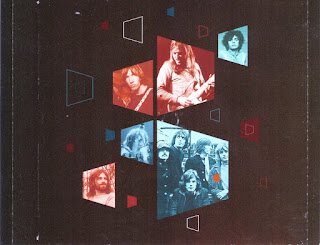Echoes: The Best of Pink Floyd is the fourth compilation album by the English rock band Pink Floyd, released on 5 November 2001 by EMI internationally and a day later by Capitol Records in the United States. It debuted at #2 on the Billboard 200 album chart on 24 November 2001, with sales of 214,650 copies. It remained on the chart for 26 weeks. The album was certified Gold, Platinum and Double Platinum on 6 December 2001 in the US by the RIAA. It was certified Triple Platinum in the US on 8 January 2002, and Quadruple Platinum on 10 September 2007.
The compilation spans the career of Pink Floyd from their first single "Arnold Layne" in 1967, through to "High Hopes", the final track from their 1994 studio album The Division Bell. Four of their albums—More, Ummagumma, Atom Heart Mother and Obscured by Clouds—are not represented whatsoever, though multiple tracks from Atom Heart Mother and Ummagumma were planned to appear on the compilation. Each of the 26 tracks fades from one to the next with no break in the music, courtesy of longtime producer/engineer James Guthrie, to help recreate the concept album feel of the band's mid-period work. All 26 tracks were newly remastered specifically for this compilation and are not sequenced in chronological order.
The band's longtime guitarist, David Gilmour, said of the process of compiling the tracks themselves:
There’s been the occasional phone call but no great brainstorming sessions to get us all together. All our stuff [is] conducted through our engineer James Guthrie, who coordinated Echoes from his place in Lake Tahoe.
Roger Waters's main contribution was the name of the compilation. "I had to, because the name the boys came up with was so awful. What was it? 'Sum of the Parts'. See what I mean?"
Storm Thorgerson, who had done the majority of album covers for Pink Floyd, did the Echoes art which features recursive windows in an infinite regression as a nod to his own cover for 1969's Ummagumma, and the objects on each landscape refer to the Pink Floyd discography. For instance, there's the man on fire from Wish You Were Here, another wearing the Delicate Sound of Thunder lightbulb suit, dolls of the Atom Heart Mother cow and the Animals pig, a bike and both a brick wall and the hammers from The Wall. Eventually Thorgerson opted to make two images, with another used for the back cover. To create the idea on a photograph, various walls - which had varied measurements and angles to ensure that "nothing seemed to fit other than by eye through the lens." - were built and put in a country landscape in Sussex. Actors, props and fittings were set in and between those walls. The original design was one of two sketches submitted for Dream Theater's 1997 album Falling into Infinity, with the original being framed and hanging in the home of former Dream Theater drummer Mike Portnoy and is pointed out by Portnoy in his Hudson Music instructional drum DVD In Constant Motion.
Echoes is Floyd's first album to include "When the Tigers Broke Free", from the film version of The Wall (the song reappeared on a 2004 rerelease of The Final Cut in a slightly remixed form). It was their first compilation to includes songs from The Final Cut, A Momentary Lapse of Reason and The Division Bell and is the only one to include "Echoes", from 1971's Meddle.
With first-week sales of 215,000 – beating their previous first-week peak of 198,000 for Pulse – the album hit number two on the Billboard 200, behind Britney Spears' Britney (746,000).
A week after the band's one-off reunion at Live 8, HMV said sales of Echoes rose by 1343%
"We’ve been arguing about it [track selection] since May. Nick sent us a list right at the beginning, then he seemed to lose interest. Rick never seemed to want to get involved in it. It wandered along rather fitfully until recently, when I thought I'd better work out what we should be trying to do with it, whether we should try and represent every album or not, and on what basis we should be choosing songs. In the end we had to get everyone to vote on a list. (...) I agree [that most of the songs seemed to have picked themselves]. When I look at it, it's bloody obvious really. It's amazing how long the process has been getting it sorted out."
— David Gilmour,


























No hay comentarios.:
Publicar un comentario